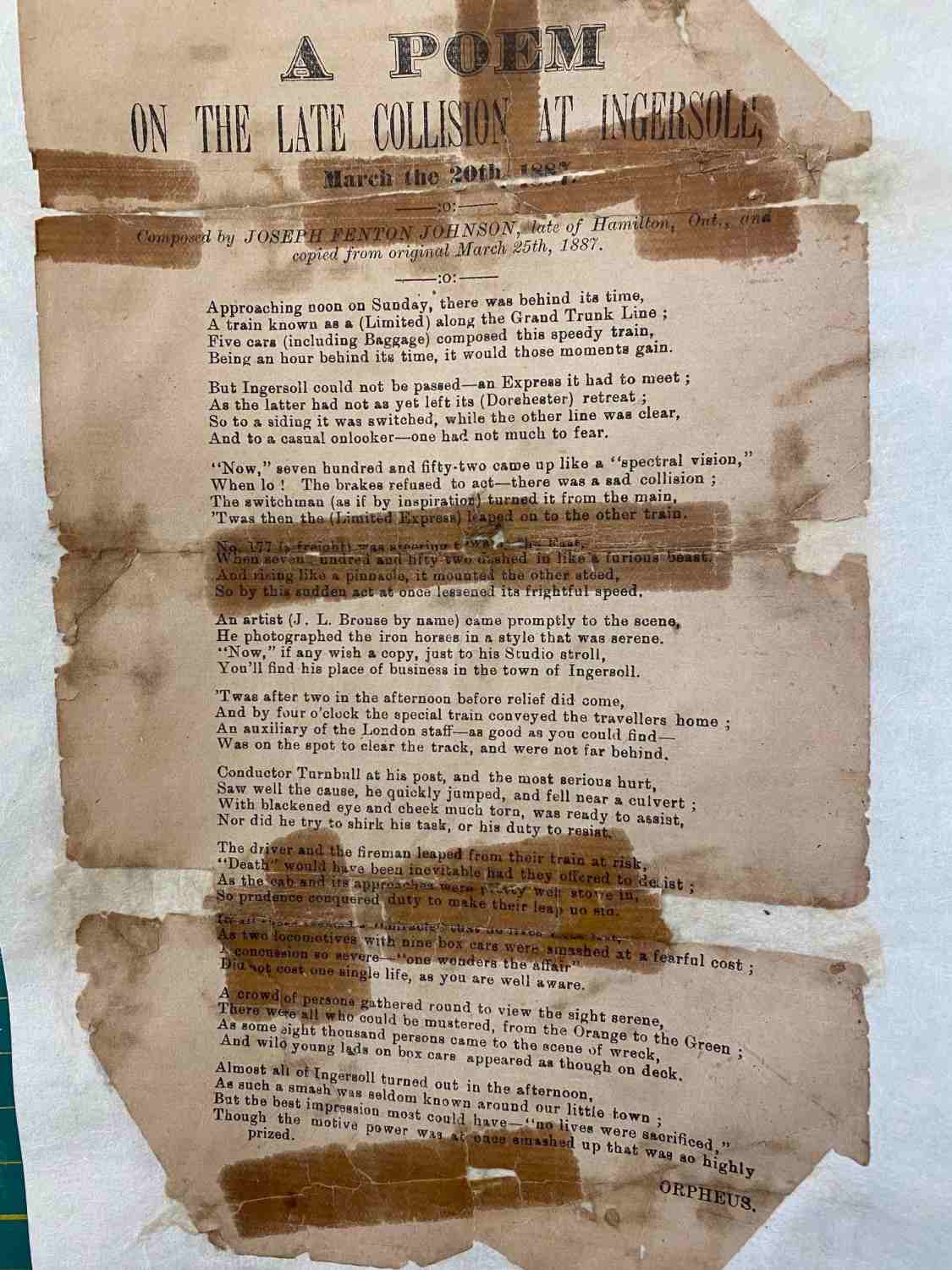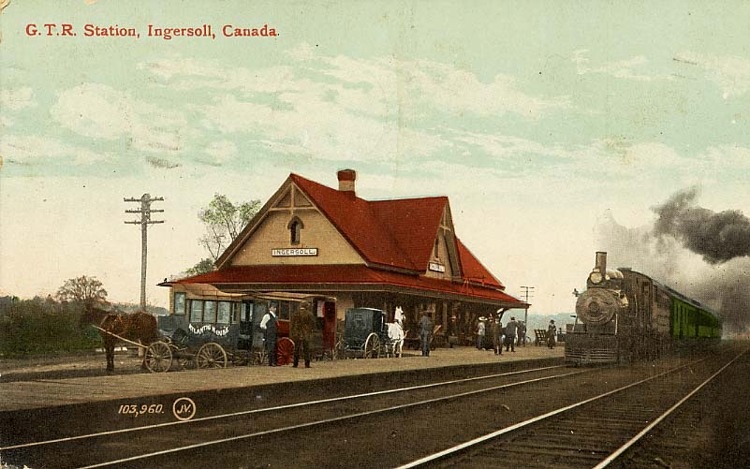The Ingersoll Train Wreck of 1887
The Ingersoll Train Wreck of 1887
By Liz Dommasch, County Archivist
Last year, we received a donation of records from Fanshawe Pioneer Village which included the following poem:
A Poem
On the Late Collision at Ingersoll
March the 20th 1887
Composed by Joseph Fenton Johnson, late of Hamilton, Ont., and copied from original March 25th, 1887.
"Approaching noon on Sunday, there was behind its time,
A train known as a (Limited) along the Grand Trunk Line;
Five cars (including Baggage) composed this speedy train,
Being an hour behind its time, it would those moments gain.
But Ingersoll could not be passed – an Express it had to meet;
As the latter had not as yet left its (Dorchester) retreat;
So to a siding it was switched, while the other line was clear,
And to a casual onlooker – one had not much to fear.
"Now,” seven hundred and fifty two came up like a “spectral vision,”
When lo! The brakes refused to act – there was a sad collision;
The switchman (as it be inspiration) turned it from the main,
‘Twas then the (Limited Express) leaped on to the other train.
No. 177 (a freight) was steering towards the east
When seven hundred and fifty two dashed in like a furious beast,
And rising like a pinnacle, it mounted the other steed,
So by this sudden act at once lessened its frightful speed.
An artist (J.L. Brouse* by name) came promptly to the scene
He photographed the iron horses in a style that was serene.
“Now” it any wish a copy, just to his Studio stroll,
You’ll find his place of business in the town of Ingersoll.
“Twas after two in the afternoon before relief did come,
And by four o’clock the special train conveyed the travelers home;
An auxiliary of the London staff – as good as you find
Was on the spot to clear the track, and were not far behind.
Conductor Turnbull at his post, and the most serious hurt,
Saw well the cause, he quickly jumped, and fell near a culvert;
With blackened eye and cheek much torn, was ready to assist,
Nor did he try to shirk his task, or his duty to resist.
The driver and the fireman leaped from their train at rick,
“Death” would have been inevitable had the offered to desist;
As the cab and its approaches were pretty well stove in,
So prudence conquered duty to make their no [?].
In all there [?] no lives were lost;
As two locomotives with nine box cars were smashed at a fearful cost;
A concussion so severe – ‘one wonders the affair”
Did not cost one single life, as you are well aware.
A crowd of persons gather round to view the sight serene,
There were all who could be mustered, from the Orange to the Green;
As some eight thousand persons came to the scene of the wreck,
And wilo young lads on box cars appeared as though on deck.
Almost all of Ingersoll turned out in the afternoon,
As such a smash was seldom known around our little town;
But the best impression most could have – “no lives were sacrificed,”
Though the motive power was at once smashed up that was so highly
prized.
ORPHEUS"

The poem tells the tale of a train collision that happened at the Grand Trunk Railway station in Ingersoll on March 20, 1887. On that fateful day, the No. 53 St. Louis Express tried to break when coming into town. However, the brakes refused to work and the train headed straight towards the No. 56 train that was waiting on the main line for the Express train to pass. The switchman on duty saw what was about to occur and had “the great presence of mind seeing the state of affairs” to turn the switch sending the Express into a freight train that was parking on the siding instead.

Luckily, all the enginemen (George Phipps, John Conveney, Alf Crouch, and Mr. Coswell) were able to jump the train and escape without injury, though Conductor John Turnbull received a number of bruises and cuts when at the last minute he jumped from the baggage car platform moments before it was smashed into fragments.
Both engines, two baggage cars, a smoking car, and nine freight cars were more or less wrecked. Amazingly, the passengers in the Pullman coaches experienced “only an easy lurch” and were unaware that a collision had taken place until they were told.
Following the crash, a large crowd from the town, Woodstock, and elsewhere, were said to have visited the scene of the accident to view the collision. A fresh engine was sent out from London and in little over an hour the scene was cleared and the No. 53 was booming westward again “as if nothing had happened.”
*Note: J.L. Brouse, was an Ingersoll photographer, who operated his business from 1885 to 1887.
